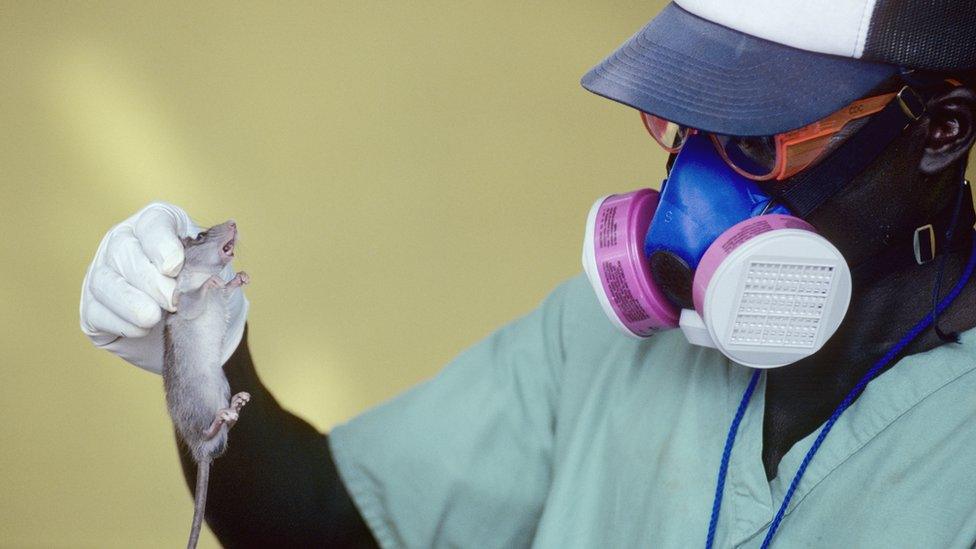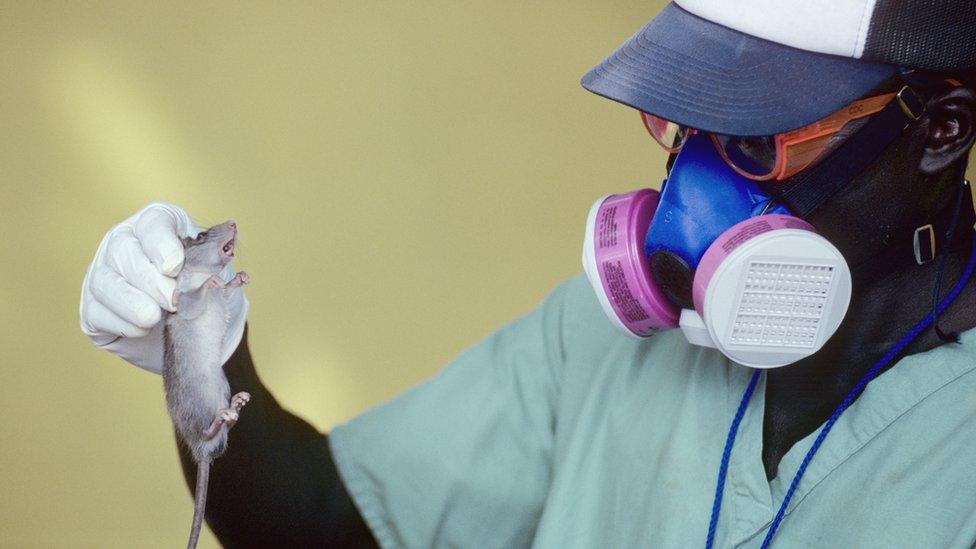Lassa fever: Patient dies at Bedfordshire hospital
- Published

A health worker in Sierra Leone pictured with a rodent, which can spread the virus to humans by contaminating food or household items
A person being treated for Lassa fever in the East of England has died, a hospital trust has confirmed.
The patient died at Luton and Dunstable Hospital, run by the Bedfordshire Hospitals NHS Foundation Trust.
The UK Health Security Agency (UKHSA) said the person who died was being treated for the animal-borne disease, which is endemic in parts of West Africa.
It said the risk to the public was "very low".
The death comes as the third case of Lassa fever was identified in the UK in the last few days.
All three cases were within the same family and were linked to recent travel to West Africa, said Dr Susan Hopkins, chief medical adviser at UKHSA.
The cases are the first of the disease to be confirmed in the UK in more than a decade.
NHS East of England has now declared a "regional major incident".
The BBC understands this is because two of the patients were treated at Addenbrooke's Hospital in Cambridge before being transferred to a London hospital.

A cousin of Ebola, Lassa fever is endemic in a number of West African countries
In a statement, the NHS said: "UKHSA advice is that some staff at the hospitals where the patients have been treated may need to undergo testing and wear more personal protective equipment (PPE) than normal.
"Staff in direct contact with confirmed cases will have to self-isolate for a period of time. This is standard procedure and precautionary only.
"Because of the impact this will have on staffing key services in our region, we have declared a regional major incident. This allows the region's healthcare systems to work together to keep services running safely."
A spokesperson for the UKHSA said: "We are contacting the individuals who have had close contact with the cases prior to confirmation of their infection, to provide appropriate assessment, support and advice."
A Bedfordshire Hospitals NHS Foundation Trust spokesperson said: "We confirm the sad death of a patient at our trust, who had confirmed Lassa fever.
"We will continue to support the patient's family and our staff and are working closely with colleagues from the UK Health Security Agency to undertake a robust contact tracing exercise."
Before the three recent cases, eight cases of Lassa fever had been identified in the UK since 1980.
The recent cases are the first of the disease to be confirmed in the UK since 2009.
Dr Hopkins said: "Cases of Lassa fever are rare in the UK and it does not spread easily between people. The overall risk to the public is very low."

What is Lassa fever?
Lassa fever, like Ebola, can be spread through contact with the bodily fluids (blood, saliva, urine or semen) of infected people
Humans can also get it by coming into contact with the urine or faeces of infected rodents that carry the disease
The disease typically causes a fever and flu-like symptoms, but it can cause bleeding through the nose, mouth and other parts of the body
Most people will make a full recovery but the illness can be fatal
Described as a cousin of Ebola, the disease is endemic in a number of West African countries


Find BBC News: East of England on Facebook, external, Instagram, external and Twitter, external. If you have a story suggestion email eastofenglandnews@bbc.co.uk, external
Related topics
- Published10 February 2022

- Published25 November 2019

- Published24 November 2019

- Published5 March 2018
